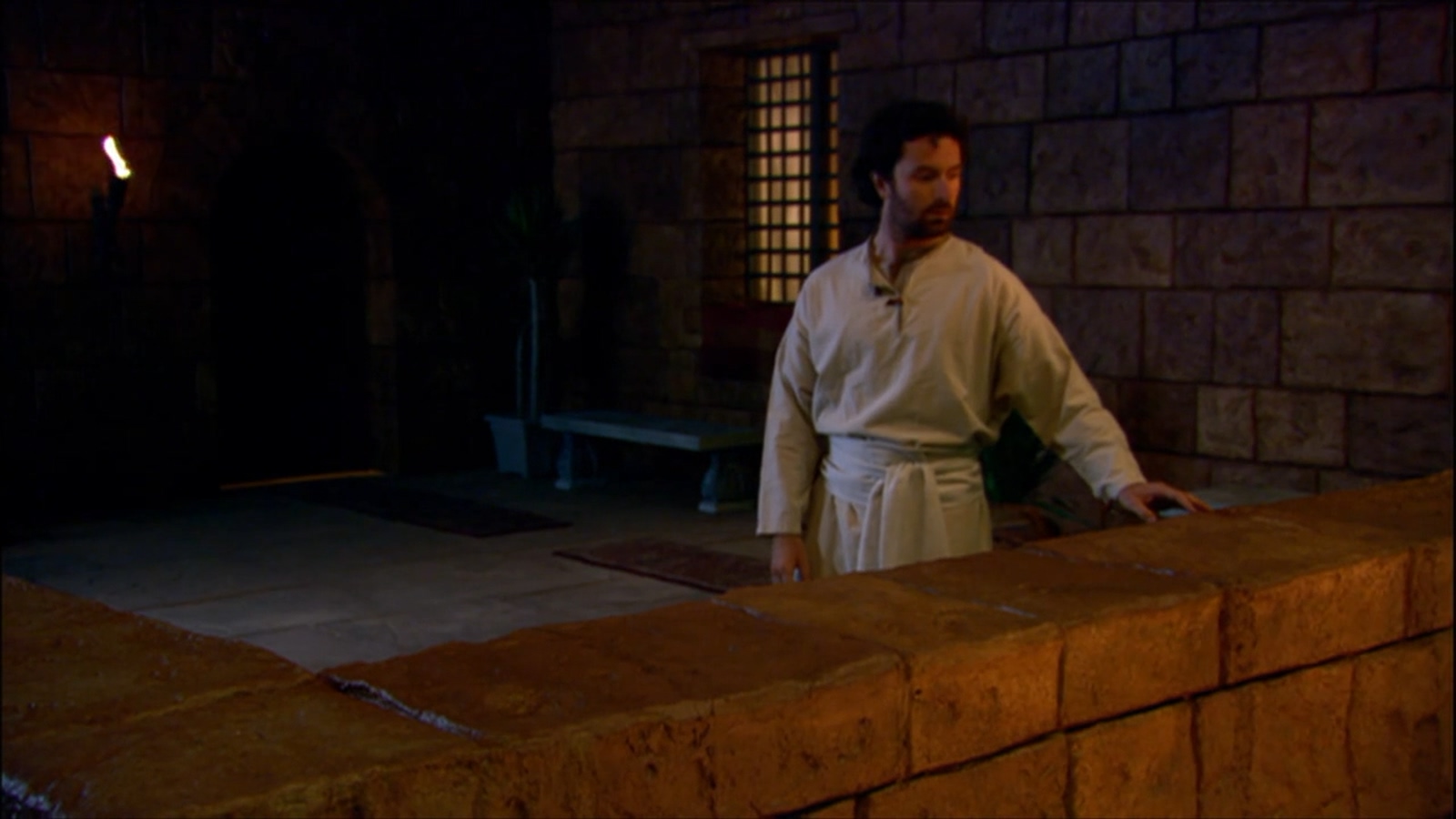To accompany your Come Follow Me study for June 20-26
In addition to reading these prescribed chapters, you may enjoy:
- The corresponding material from the Institute student manual found in the online Gospel Library
- The remaining chapters of 2 Samuel and 1 Kings 1-16 to get the “rest of the story.”
- The video Come Follow Me 2022 LDS (June 20-26) 2 Samuel 5-12 & 1 Kings 1-11 | Look to the Lord at https://www.youtube.com/watch?v=hu6g93OjggM
If you would enjoy seeing a Kahoot game related to this material which you could use for your own amusement or with your family or class, click here: https://create.kahoot.it/share/2-samuel-5-7-11-12-1-kings-3-8-11/3d2a7015-a3a1-4a8f-91d7-c4ad74b37280. (To use it with a group, after clicking on this link, you will need to log into Kahoot, creating a free account if you have not done so previously, then click on the blue “Start” button.)
Points to Ponder in 2 Samuel 5-7; 11-12; 1 Kings 3; 8; 11
1. How was the way David became king different from how national leaders are installed today? How were early Israelite kings different from the typical kings of the ancient world?
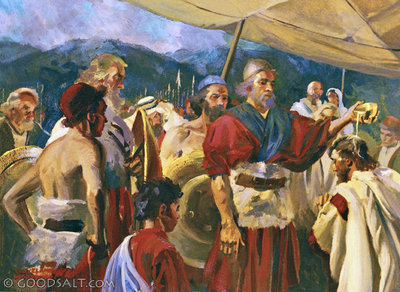
2. How can you justify the Lord’s killing Uzzah in 2 Samuel 6, when Uzzah was only trying to help keep the sacred ark of the covenant from falling and getting damaged?
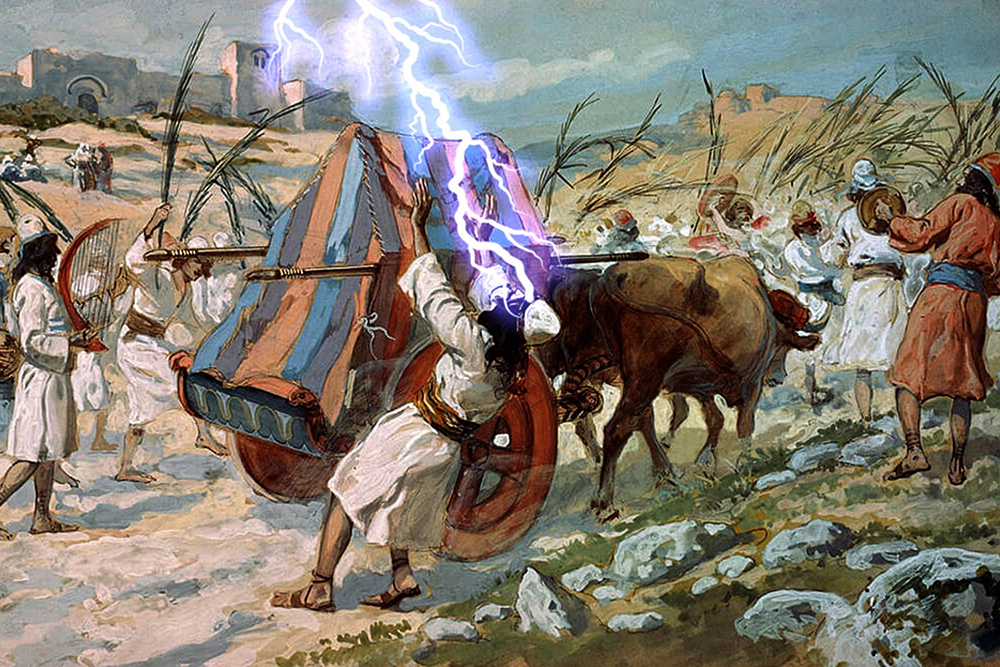
3. What applications can we make of this “don’t steady the ark” principle in our lives today?

4. How many good deeds and how many bad deeds of David can you find just in the indicated readings for this week? On balance, was David a good guy or a bad guy?
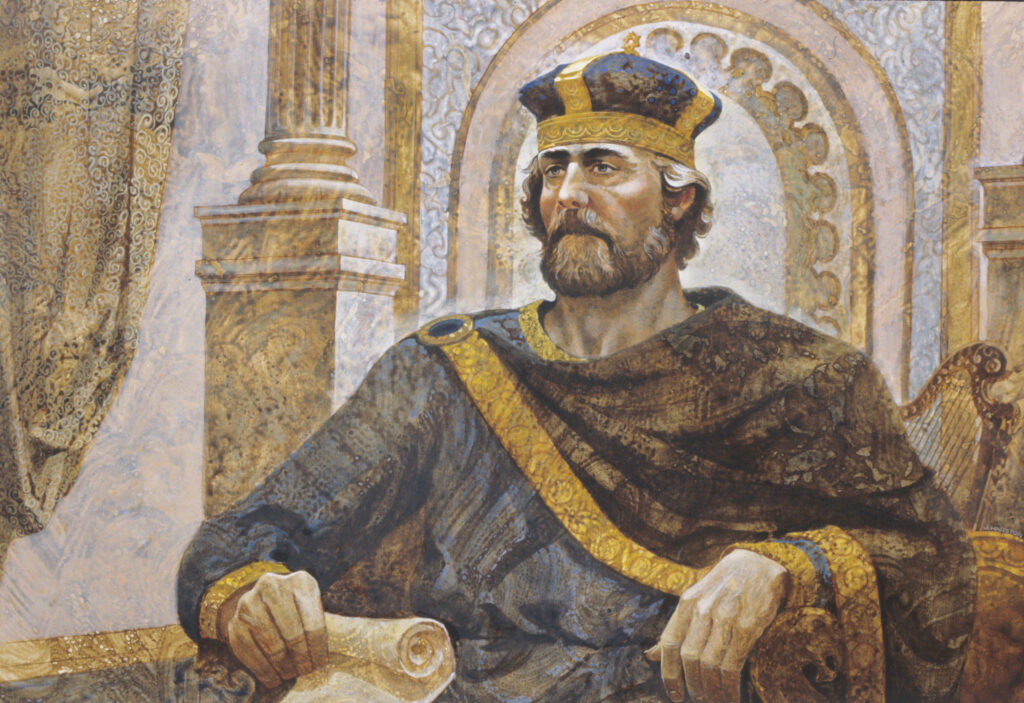
5. Since the prophet Nathan told David “The Lord also hath put away thy sin; thou shalt not die” (2 Samuel 12:13), why are Latter-day Saints so harsh toward him and certain that he has lost his exaltation?
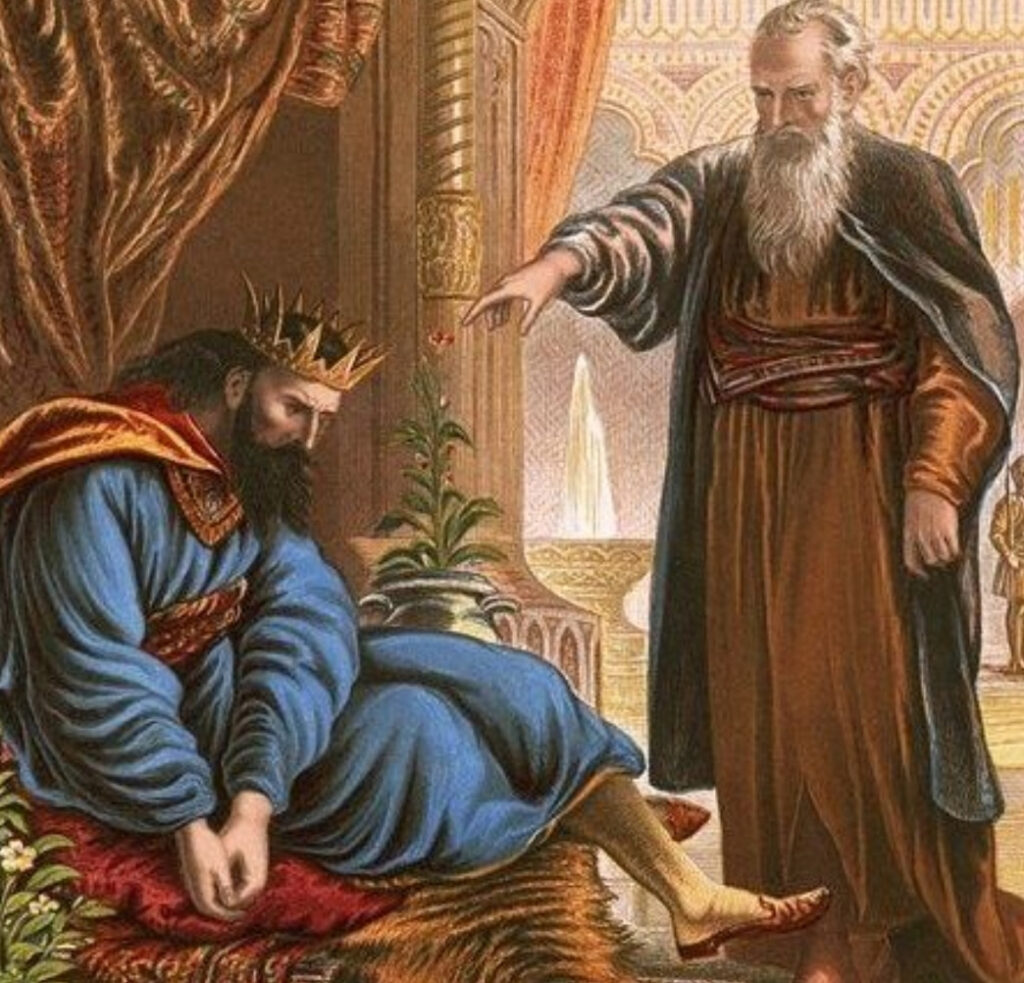
6. What were the steps downward David took that led him ultimately to commit adultery with Bathsheba and later murder to cover it up? What can we learn from David’s mistake?
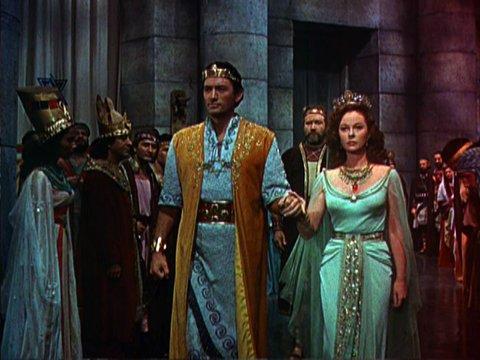
7. Though “Solomon loved the Lord,” what weakness do we discover in him early on which later appears to have grown to the point that it proved his downfall?
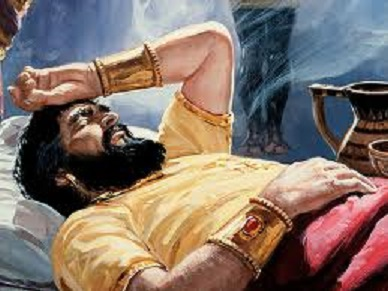
8. What are the major lessons we can learn from the story of the Lord’s inviting Samuel to ask for whatever he wanted? (1 Kings 3:5)
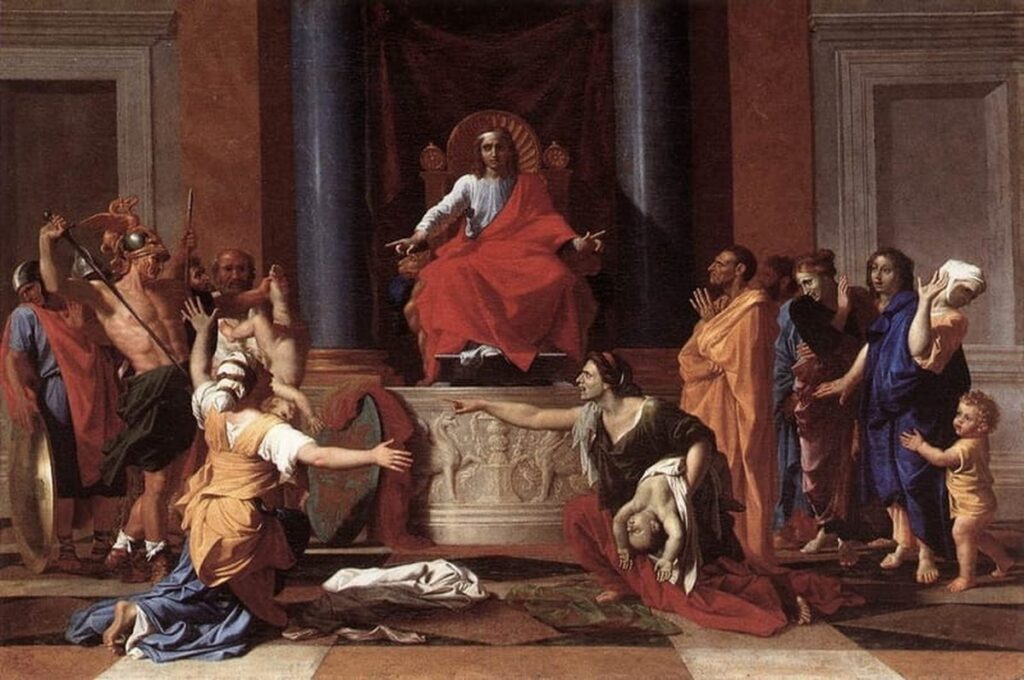
9. What do you think is worth remembering from 1 Kings 8 about the temple?
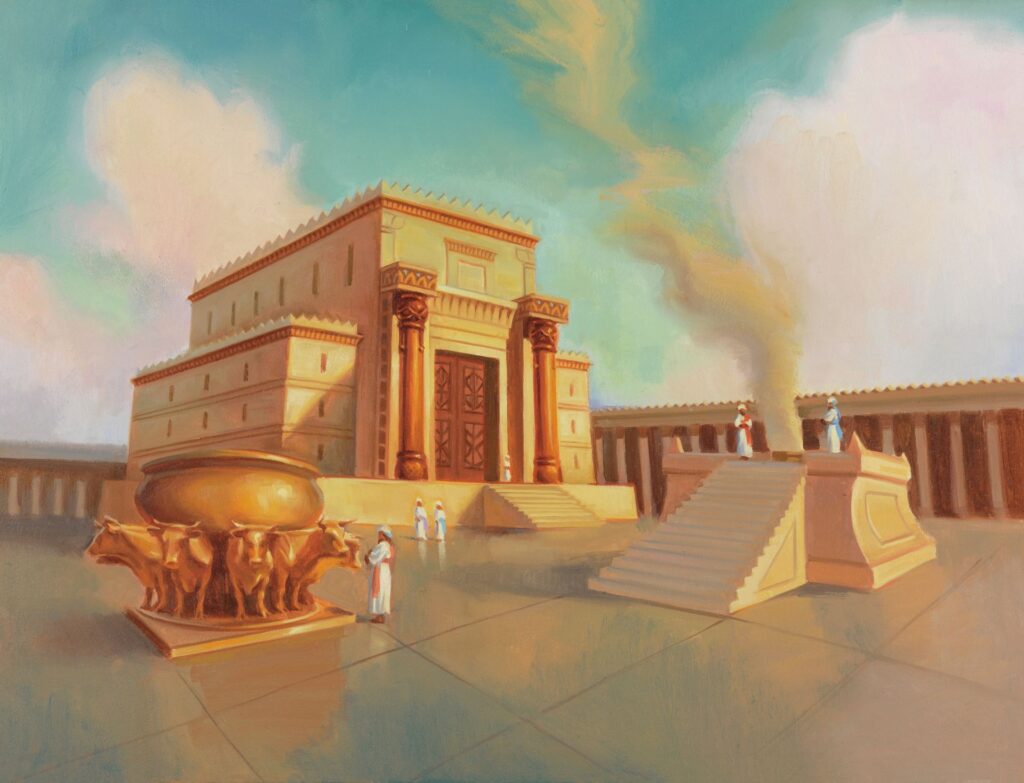
10. Since plural marriage was not prohibited in Solomon’s day, what was so wrong with his having a thousand wives and concubines?
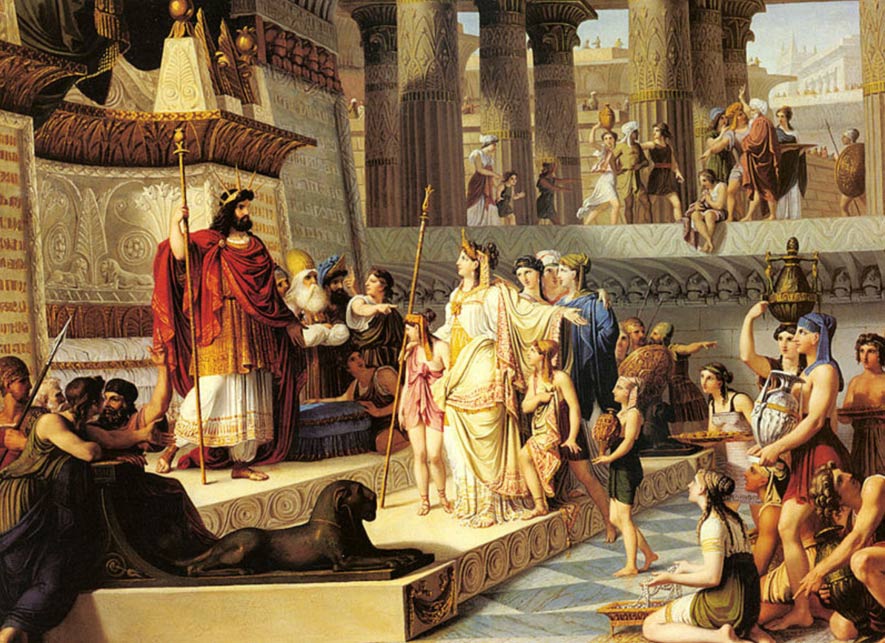
Possible Answers to Points to Ponder in 2 Samuel 5-7; 11-12; 1 Kings 3; 8; 11
1. How was the way David became king different from how national leaders are installed today? How were early Israelite kings different from the typical kings of the ancient world?
David was not elected, nor did he assume the monarchy by force, but he was called of God through Samuel and was anointed by the elders of Israel, after making a “league” or covenant with them. This was similar to the sustaining vote with which leaders in the Church today are installed.
David’s reign, was that of a limited monarch. Much power remained with the people. Government was decentralized. And having been appointed by a prophet, with popular consent, he could theoretically be deposed in the same way, should the need arise.
2. How can you justify the Lord’s killing Uzzah in 2 Samuel 6, when Uzzah was only trying to help keep the sacred ark of the covenant from falling and getting damaged?
We don’t know Uzzah’s motives. It is possible he was thinking, “Aha! Here’s my chance to touch the ark, as I can pretend I was just trying to keep it from falling.” If so, we can stop feeling sorry for him at all. On the other hand, it is completely possible that Uzzah’s motives were pure and that he was as surprised as anyone else that he was subjected to capital punishment.
What we do know is that (1) the Lord had been very specific that no one but an authorized Levite was to touch the ark and (2) that Israel had a very hard time understanding that the Lord cannot look upon sin with the least degree of allowance. It was evidently more important to underline that principle than to let Uzzah eventually die from old age. If he was indeed innocent of bad intentions, I can picture the Lord (or His representative) telling an astonished Uzzah, as he entered the spirit world, “Sorry about that, Brother Uzzah! But you’ll love it here. And we’ll watch over your wife and kids and help them get by fine for the next forty (or 70) years without you. But what a lesson you helped us teach the rest of Israel today! And you’re going to be memorialized forever in 2 Samuel 6.” 😊
3. What applications can we make of this “don’t steady the ark” principle in our lives today?
We need to remember that just because something ought to be done doesn’t mean that we are the ones who should do it. For example:
- It’s the role of the bishop or his counselor to tell a priest he needs to repeat a sacramental prayer. Others would be out of place to stand up in sacrament meeting and insist on it.
- We have no right to cast a dissenting vote during the sustaining of officers just because we think someone else would have made a better bishop or Relief Society president. We are not being asked our opinion at such a time. We are being asked if we are willing to get behind and help whoever has been called by proper authority to the position.
- We have no right to vote against someone’s ordination to a priesthood office unless we have information that we are confident the presiding authorities didn’t have and are equally confident that such information would have made a difference, had they had it. (Even then, it would be much better to go to the bishop or stake president in private than to cast a negative vote in a meeting.)
- We would be out of place to lobby for the ordination of women to the priesthood.
- We would be equally out of place to publicly campaign for a different COVID masking policy than the one President Nelson put forth.
- We have no right to try to prevent someone from going to the temple if his bishop and stake president have given him a recommend.
None of this means, of course, that we cannot privately bring information to the attention of our leaders or even offer our point of view on the propriety of a contemplated course of action. It does mean that we must not take it upon ourselves to otherwise either promote or oppose a policy or action of those in authority over us.
4. How many good deeds and how many bad deeds of David can you find just in the indicated readings for this week? On balance, was David a good guy or a bad guy?
Good deeds:
- Sought the Lord’s counsel about going to battle against the Philistines. (2 Samuel 5:19)
- Burned the pagan images of the Philistines (2 Samuel 5:21)
- Sought and followed the Lord’s instructions a second time in battle against the Philistines (2 Samuel 5:23-25)
- Began to bring the ark of the covenant to the city of David with a great and appropriate celebration (2 Samuel 6:1-7)
- Eventually finished the job of bringing the ark into the city with gladness and with sacrifice. (2 Samuel 6:11-20)
- Desired to build a temple to the Lord (2 Samuel 7)
- Fasts and prays for his sick child (2 Samuel 12:16)
- Worships the Lord in His house (2 Samuel 12:20)
- Comforted Bathsheba after the loss of her son (2 Samuel 12:24)
Bad deeds:
- Was upset that the Lord killed Uzzah and wouldn’t finish bringing the ark into the city (2 Samuel 6:8-10)
- Was vengeful toward his wife, Michal (2 Samuel 6:23)
- Commits adultery with Bathsheba (2 Samuel 11:4)
- Has Uriah, Bathsheba’s husband, killed (2 Samuel 11:15-27)
Even though one might point out that there are nine good deeds recorded and only four bad ones, the bad far outweigh the good. Though considered a great hero by the Jews, David, in the eyes of Latter-day Saints in particular, is a prime example of unfulfilled potential and lost opportunity.
5. Since the prophet Nathan told David “The Lord also hath put away thy sin; thou shalt not die” (2 Samuel 12:13), why are Latter-day Saints so harsh toward him and certain that he has lost his exaltation?
Latter-day Saints have information in D&C 132 that the rest of the world does not have. D&C 132:39 tells us: “David’s wives and concubines were given unto him of me, by the hand of Nathan, my servant, and others of the prophets who had the keys of this power; and in one of these things did he sin against me save in the case of Uriah and his wife; and, therefore he hath fallen from his exaltation, and received his portion; and he shall not inherit them out of the world, for I gave them unto another, saith the Lord.” It is worth noting that Joseph Smith also changed 2 Samuel 12:13 to read: “The Lord also hath not put away thy sin that thou shalt not die.” As the footnote in the Latter-day Saint edition of the Bible states, “He was not punished immediately by death; but he did not escape punishment.” David did not die temporally for his sin, but he did die spiritually.
6. What were the steps downward David took that led him ultimately to commit adultery with Bathsheba and later murder to cover it up? What can we learn from David’s mistake?
- He was in the wrong place at the wrong time. This was “the time when kings go forth to battle” (2 Samuel 11:1), but rather than go with his troops, as he should have, he sent Joab to lead the Israelites into battle. We likewise need to be careful to be where we ought to be.
- When David saw Bathsheba washing herself, he should have turned away immediately. The comment that “the woman was very beautiful to look upon” (11:2) suggests that David lingered to look longer. A powerful lesson about the dangers of pornography could be taught here.
- We might note that Bathsheba herself is not necessarily blameless. She might have done more to ensure her privacy while bathing. She might have protested when David invited her to his chambers.
- David wasn’t content to just look. He “sent and inquired after the woman.” (11:3) and later sent messengers and took her. Even then, David might have escaped had he not violated the common-sense rule about never being alone with a member of the opposite sex.
- We see in David’s life how one sin often leads to another. David might not have lost his eternal exaltation had he stopped at adultery. But, as Jacob reminds us in 2 Nephi 9:35, “Wo unto the murder who deliberately killeth, for he shall die.”
7. Though “Solomon loved the Lord,” what weakness do we discover in him early on which later appears to have grown to the point that it proved his downfall?
1 Kings 3:3 tells us that while Solomon loved the Lord, he still “sacrificed and burnt incense in high places,” contrary to the Lord’s instructions. This willingness to think that not all of the commandments applied to him later allowed Solomon to turn his heart away from the Lord completely and worship the pagan gods of his wives and concubines.
8. What are the major lessons we can learn from the story of the Lord’s inviting Samuel to ask for whatever he wanted? (1 Kings 3:5)
As the Lord says in D&C 11:7, “Seek not for riches, but for wisdom…. And then shall you be made rich.” Many in Solomon’s position would have asked for wealth. Others might have asked for fame or honor. Because Solomon wisely asked for wisdom, the Lord blessed him not only with wisdom but with the riches and honor he had not requested. Similarly, as Jacob taught in Jacob 2:19, “After ye have obtained a hope in christ ye shall obtain riches, if ye seek them; and ye will seek them for the intent to do good….”
9. What do you think is worth remembering from 1 Kings 8 about the temple?
- That “the cloud filled the house of the Lord,” symbolic of the Spirit’s filling our temples.
- Temple dedications are sacred and solemn events.
- Though we call temples “the house of the Lord,” God’s presence is in no way confined to the interior of a building. (1 Kings 8:27)
- There is special power in prayers offered in temples. All are invited to submit names to the temple prayer roll. (Implied.)
- To realize the blessings of the temple, it is important that our “heart … be perfect with the Lord our God, to walk in his statutes, and to keep his commandments.”
- Just as Solomon offered bountiful sacrifices at the new temple, so should we consider what we are prepared to sacrifice to worship in the temple and as a consequence of our temple worship.
10. Since plural marriage was not prohibited in Solomon’s day, what was so wrong with his having a thousand wives and concubines?
Referring to David, Moses, Solomon, and others, the Lord said in D&C 132:38 that “in nothing did they sin save in those things which they received not of me.” The problem with Solomon’s wives was not their number. It was not that he lacked the means to support them, or even that there wouldn’t be enough potential wives for all the other men. It was that Solomon chose wives for himself which were not authorized by the Lord or his servants. And they could not have been authorized, because they were primarily pagan women who worshipped pagan gods and who led Solomon into their worship as well. Solomon thus became the third of the first three Israelite kings to start out great and end up in tragedy, as had Saul and David before him.
